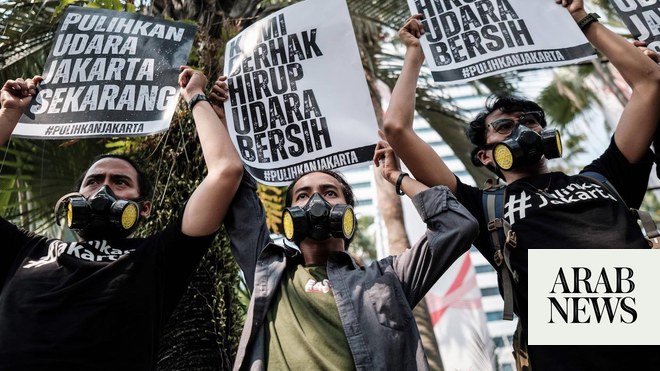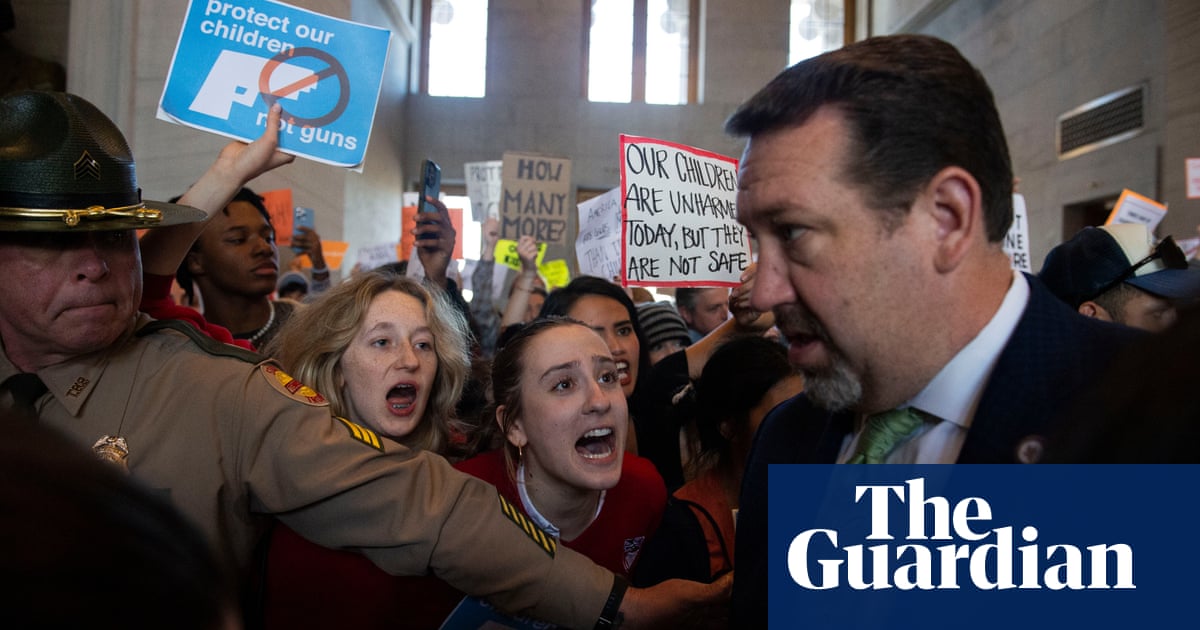
Jakarta has been recording ‘unhealthy’ levels of dangerous airborne particles
Experts warn of long-term effects of poor air quality on health
JAKARTA: Dozens of activists in Jakarta held a protest on Wednesday over worsening air pollution, as residents and experts linked health problems to poor air quality that has made the Indonesian capital one of the world’s most polluted cities.
Jakarta has consistently ranked among the 10 most polluted cities globally and regularly recorded “unhealthy” levels of PM2.5, a measurement of particulate matter — solid and liquid particles suspended in the air that can be inhaled and cause respiratory diseases.
Public discussion of the issue picked up pace in recent weeks after Jakarta topped Swiss company IQAir’s ranking of air pollution in major cities for several days and residents began attributing various health problems to the poor air quality.
“This situation is at a precarious stage because air pollution has caused people to be infected with various diseases,” Ibukota, the civil society coalition that organized Wednesday’s protest in front of the Jakarta city hall, said in a statement.
Asmara Wreksono, a 44-year-old visual artist in Jakarta, recently took her 10-year-old daughter to an ear, nose and throat specialist after she was sick for more than two weeks with a runny nose and coughs.
“The diagnosis is bacterial infection in the throat, most likely caused by the pollution,” Wreksono told Arab News. “We were advised to mask up and limit outdoor activities, as well as to turn up our air purifier at home.”
Wreksono, who was born and raised in Jakarta, said there has been a “significant change” in air quality over the years. When she took to X, the social media platform formerly known as Twitter, to talk about her daughter’s health issues, she did not expect scores of others to share similar stories.
“(But) I wasn’t surprised that a lot of people experienced the same thing because the ENT specialist told me that the number of patients with the same complaint increased these past two months,” she said.
Pulmonologist Erlina Burhan said that her practice has been receiving more patients with similar respiratory issues.
“Many patients are complaining of sneezes, runny nose and coughs, which I found out later was actually bronchitis, so there has indeed been an increase in respiratory infections,” Burhan told Arab News.
“Many of my asthma patients who seldom come to see me have been coming for appointments recently, and I suspect that this was triggered by unclean air,” she added.
On Monday, President Joko Widodo held a cabinet meeting to address the pollution issue, and instructed ministers to establish more green spaces and encourage offices to implement hybrid working, among other strategies to tackle the problem.
Like other Jakarta residents, Widodo has reportedly been nursing a cough for weeks.
Piotr Jakubowski, co-founder of Indonesian air quality data app Nafas, told Arab News: “Air pollution has been an issue in Jakarta for a long time; this is not the first year that this is a problem. It’s one of the first years in many where enough of the general public care about it in order to voice their opinions in a way that catches the attention of the government.”
Jakubowski said that poor air quality is also a problem for other Indonesian cities, and highlighted the importance of a collective approach to understand the sources of pollution affecting major urban areas.
“It’s an issue for everybody — young, old, rich, poor — and it’s something that needs to be solved with an action plan as soon as possible,” he said.
Ivan Jayawan, an environmental expert and adjunct faculty at the Krida Wacana Christian University in Jakarta, said that when it comes to air pollution, the public bears a “massive cost.”
“Air pollution is not to be taken lightly; the long-term effect is serious, too. Many studies have shown that air pollution is connected to other diseases people thought had nothing to do with air pollution exposure, such as cardiovascular diseases, hypertension, diabetes, Alzheimer’s, dementia, liver diseases, etc,” he said.
Vulnerable members of the public, such as the elderly, children and pregnant women, are likely most affected by the problem, he added.
In 2021, a court ruled in favor of a lawsuit filed by activists and citizens against the government, ordering Widodo to clean up the city’s notorious air pollution, and ruling that he and other top officials were negligent in protecting residents.
However, efforts to address the problem are still less than optimal, according to Suci Fitria Tanjung, executive director of the Indonesian Forum for the Environment, in Jakarta.
“Today’s protest is one of many public efforts to remind and straighten up the government’s work so that it follows the mandate of protecting the people’s public health and fulfilling our civil rights to a healthy and clean environment,” Tanjung, who is also part of the Ibukota coalition, said.
Jakarta residents such as Wreksono worry about how pollution is affecting quality of life in the capital, which is notorious for its traffic congestion and overly dense neighborhoods, and hope officials will take extra measures to change policies.
“I just need the government to do its job right,” she said. “We are taxpayers, and we demand them to do so.”












